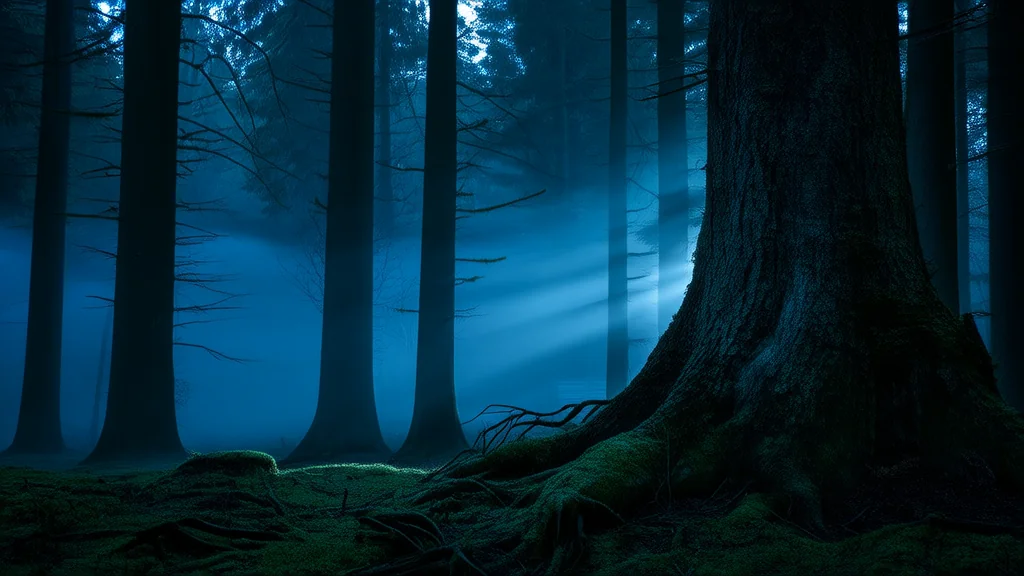🔮 Weird Tales & Urban Legends
The Whispering Woods and the Bell of Elmsworth

In the remote village of Elmsworth, nestled between fog-drenched hills and whispering pines, there were stories that never left the lips of the elders. They spoke of the "Bellow," a creature said to roam the woods at dusk, its form shifting like smoke and its voice echoing like a deep, sorrowful bell. No one had seen it, but everyone believed in it.
The Bellow was not a monster, they claimed, but something older—something that had watched over the land long before the first houses were built. It was neither man nor beast, but something in between, born of the earth itself. The villagers would light candles and leave offerings of salt and bread at the forest’s edge, hoping the Bellow would pass them by.
One autumn evening, as the leaves turned crimson and the air grew sharp with the scent of decay, a young woman named Lira arrived in Elmsworth. She was a writer, seeking inspiration for her next book, and she had heard the tales of the Bellow from an old librarian who had lived in the village for decades. The librarian warned her not to go into the woods alone, but Lira was stubborn and curious.
She set up camp near the edge of the forest, a small tent pitched beneath a gnarled oak. Each night, she would sit by the fire, scribbling in her notebook, listening to the wind through the trees. The silence was thick, almost alive, and the shadows seemed to stretch longer than they should. On the third night, she heard it—a low, resonant sound, like a bell being struck in the distance. It wasn’t loud, but it was unmistakable, and it sent a chill down her spine.
The next morning, she found a trail of footprints leading into the woods, though no one had been there since she arrived. The prints were too large, too deep, and their shape was unfamiliar. She followed them for a while, her breath shallow, her heart pounding. The deeper she went, the more the forest seemed to change. The trees grew taller, their trunks twisted, and the air felt heavier, as if the world itself was holding its breath.
At midday, she came upon a clearing where the ground was covered in moss and wildflowers, untouched by time. In the center stood a stone archway, weathered and carved with symbols she couldn’t recognize. A faint mist curled around its base, and the air was filled with a strange, sweet scent. She stepped closer, drawn by an unexplainable pull. As she reached out to touch the stone, the mist thickened, and the sound returned—the bell-like echo, this time much closer.
Lira turned, expecting to see something monstrous, but instead, she saw a figure standing at the edge of the clearing. It was tall, its body wrapped in a tattered cloak, its face hidden beneath a hood. It did not move, but it watched her. She took a step back, her pulse racing, and the figure tilted its head slightly, as if acknowledging her presence.
Then, without warning, the figure vanished, leaving only the mist behind. Lira ran back to her tent, her hands trembling, but when she arrived, she noticed something strange. Her notebook was open, and the pages were filled with words she hadn’t written. The text described the clearing, the archway, and the figure, as if she had seen it all before.
Over the following days, Lira became obsessed. She returned to the forest each night, determined to uncover the truth. She found more symbols, more trails, and once, a pool of water that reflected not her face, but something else—something with eyes and a mouth that didn’t belong to her. She began to feel watched, not just by the forest, but by something deeper, something ancient.
On the final night, she ventured further than ever before. The trees closed in around her, the sky darkened, and the air grew colder. She stumbled upon a cave, its entrance marked with the same symbols she had seen in the clearing. Inside, the walls pulsed with a soft, blue light, and the ground was covered in bones, some human, others not. At the center of the cave stood a figure, identical to the one she had seen before.
This time, it turned to face her. Its hood fell away, revealing a face that was both familiar and alien, as if it had once been a part of her. It opened its mouth, and the bell-like sound filled the cave, not as a warning, but as a call.
Lira felt herself pulled forward, as if the cave itself was guiding her. She reached out, and in that moment, the world shifted. The cave, the forest, the village—all of it blurred, and she was somewhere else, somewhere not of this world. She saw visions of the past, of people who had come before her, of those who had tried to understand the Bellow and had never returned.
When she awoke, she was back at her tent, the sun rising over the hills. The notebook was gone, and her memories of the cave were hazy, like dreams slipping through her fingers. She never wrote about the Bellow again, but she always kept a candle burning at the edge of the forest, just in case.
And sometimes, when the wind was right, she swore she could still hear the bell.
Published on en
🔗
Related Sites
- AI Blog — AI trends and tech news